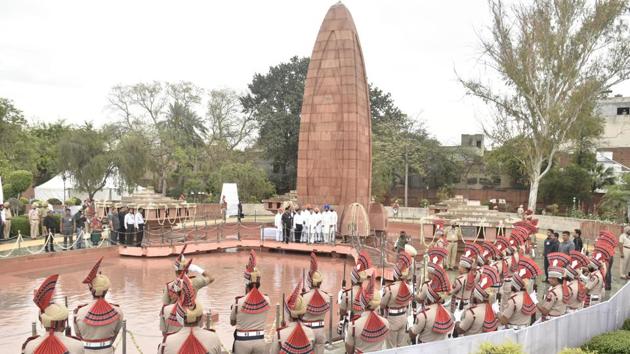Forgetting history and the Jallianwala Bagh massacre of 1919
Maybe new generations must grow up free of the memory and pain of the massacre which took place 100 years ago
It is still April when I visit Jallianwala Bagh, a full 100 years after the 1919 massacre. The newspapers are full of recollections. Television channels are going hoarse with capsuled history lessons about the Rowlatt Act and the Hunter Commission. A British apology for the massacre is a popular hashtag. As I walk in, I recall an afternoon spent three decades ago at Auschwitz: the hushed silence of its screaming dead, the horror in every brick, the sense of unforgivable outrage still haunts me.

But at the Bagh it is just another day in the park. Groups of tourists are gathering near the statue of Udham Singh. Mercifully, not many stop to look at it carefully; there is not the slightest resemblance to the man. They proceed chattering through the narrow lane through which Dyer brought his soldiers, oblivious of its significance. It’s hardly their fault: there is nothing in the lane to induce a sense of sobriety, nothing to highlight its fortuitous narrowness which prevented Dyer from taking in two armoured cars with machine guns and killing more people.
Inside, the visitors are not confronted with a stark barren field, enclosed on all sides, with scarcely a structure or tree to hide behind, as the place was in 1919. Instead they see a park with trees, flowering bushes, dividing hedges, paved walkways. And several structures: two colonnades of pink sandstone; a structure around the tragic well; a cenotaph; a museum. Oddly, two benches have been placed in front of the obelisk that marks the place from where Dyer’s soldiers fired, perhaps to signify that some people were shot in the back. Hedges shaped like Dyer’s crouching soldiers complete the caricature. Amid all this, it is impossible to feel the sense of desperate vulnerability that must have prevailed among the victims. Instead, the visitors are all set to follow the advice of a popular tourism portal: “Be sure to admire the park’s pristine flower-filled gardens.”
Free from any discipline of the memorial to observe decorum or follow a defined loop, the visitors picnic merrily in the shaded colonnades. They pop cold drinks, eat packed lunches, stare at their phones and forward jokes. There is nothing much to hold them at the museum either: a few dusty second-grade paintings and portraits. I don’t see anybody stopping to read the inscriptions: the writing is too far and too small.
Besides, there is more fun to be had outside. Getting a grinning selfie at the surviving samadhi, for instance, making sure that the cap is tilted just right and the dark glasses in place. The more curious tourists are trying to touch, and widen, the bullet holes in the walls. The cenotaph, even though there is no water in the pools around it, is a popular selfie spot. Nobody reads the sign that asks visitors to take off their shoes as they approach the monument. It is too hot to go barefoot and nobody’s watching anyway.
The visitors exit through another dusty room. Among the sundry newspaper exhibits in glass cases, is placed most incongruously, even disrespectfully, an urn containing a part of Udham Singh’s ashes. On display is also a photograph of Udham Singh: the guardians of the museum would do well to examine that photograph closely — in all likelihood, it is the photograph of Udham Singh the Ghadar revolutionary and not of the man who shot Michael O’Dwyer.
Somewhere nearby is Kucha Kaurianwala, the lane where a missionary woman, Marcella Sherwood, was assaulted, leading to Dyer’s infamous crawling order. The soul-killing punishment of making Indians crawl deserved, in Gandhi’s view, greater condemnation than the massacre itself. But there is no map or sign at the Bagh to point the visitor to this lane, the next logical stop in the pilgrimage. The bored man at the, sorry, dusty book counter shrugs his shoulders indifferently. Outside, I ask two young men who, I presume, should know every lane in town. Once I have managed to distract them from their smartphones and one of them has reluctantly pulled out an earphone away from his ear, he responds: “Kaurianwala? Maybe Kulchianwala. Kulwant Kulchianwala. Best kulcha in Amritsar.”
It takes phone calls to an old Amritsar bookseller and a scholar at the British Library in London to get directions. The point to get to, they tell me is Kesar ka Dhaba. Reconciled already to the fact that in Amritsar most things somehow boil down to food, I head there. After a quite unnecessary raising of my cholesterol levels at the dhaba, the directions lead me to the Kucha. The locals know: the owner of the corner shop points out the well that is now a temple and talks about tourists who sometimes come there. He smiles distantly when I tell him that there should be a plaque and signage — it might even be good for business. The Kucha today is just another lane with rickshaws locked in a jam and one by one the historic houses are being pulled down to build new structures.
Maybe that’s how we are: History is the dead past, meant to be forgotten. Stones are just stones, not speaking witnesses. No need for constantly reliving tragedy, or keeping alive the horror and outrage. The new generations must grow up unburdened, free of memory or nostalgia or pain. Maybe.
Navtej Sarna is the author of several works of fiction and non-fiction and formerly Ambassador of India to the United States
The views expressed are personal



